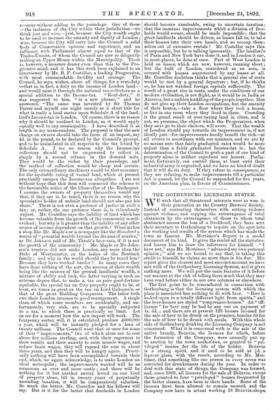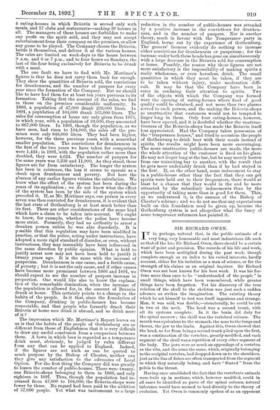THE GOTHENBURG LICENSING- SYSTEM.
WE wish that all threatened interests were as wise in their generation as the Country Brewers' Society. Instead of contenting themselves with setting violence against violence, and capping the extravagance of total abstainers by the extravagance of those to whom total abstinence means the loss of a livelihood, they have sent their secretary to Gothenburg to inquire on the spot into the working and results of the system which has made the town so famous. Mr. Mortimer's Report is a model document of its kind. It gives the reader all the statistics, and leaves him to draw the inferences for himself. "I have not," says Mr. Mortimer, "advanced my own personal opinion ; " and we are bound to say that, in taking this credit to himself, he claims no more than is his due. His report gives the clearest and most succinct account we have met with of the Gothenburg Licensing System, and it gives nothing more. We will put the main features of it before our readers at the risk of telling them much that they may have read before either in our own columns or elsewhere.
The first point to be remembered in connection with Gothenburg is that the licensing system with which the place is associated has nothing to do with beer. "Beer is looked upon in a totally different light from spirits," and the beer-houses are styled "temperance-houses." An" off- licence" for beer may be had by any one on payment of 4s. 6d. ; and there are at present 128 houses licensed for the sale of beer to be drunk on the premises, besides 59 for the sale of beer to be drunk with meals. With this whole side of Gothenburg drinking the Licensing Company is not concerned. What it is concerned with is the sale of the native brandy, Branyin, the licences for which, before the formation of the Company, were annually put up to auction by the town authorities, or granted to " pri- vileged " houses for the life of the holder. Branvin is a strong spirit, and it used to be sold at -id. a liqueur glass, with the result, according to Mr. Mor- timer, that something like one person in every seven was convicted for drunkenness during the year. In order to deal with this state of things, the Company was formed, and, since 1868, all licences for the sale of Briinvin, except those granted to four " privileged " houses frequented by the better classes, have been in their hands. Some of the licences have been allowed to remain unused, and the Company now have in actual working 18 Briinvin-shops, 4 eating-houses in which Briinvin is served only with meals, and 17 clubs and restaurants—making 39 houses in all. The managers of these houses are forbidden to make any profit on the spirit sold, and they may not accept entertainment from their company on the premises, or allow any game to be played. The Company choose the Briinvin, bottle it themselves, and deliver it at the various houses. The sales are limited on week-days to the hours between 9 a.m. and 6 or 7 p.m., and to four hours on Sundays, the last of the four being exclusively for Briinvin to be drunk with a meal.
The one fault we have to find with Mr. Mortimer's figures is that he does not carry them back far enough. They show the quantities of Briinvin sold, the convictions for drunkenness, and the number of paupers for every year since the formation of the Company. But we should like to have had them for at least ten years previous to its formation. Taking first the amount of the sales, we find in those on the premises considerable uniformity. In 1866, a population of 47,000 drank 260,000 liters. In 1891, a population of 104,000 drank 565,000 liters. The sales for consumption at home are only given from 1875, in which year, with a population of 59,000, they amounted to 867,000 liters. In 1891, though the population, as we have seen, had risen to 104,000, the sales off the pre- mises were only 848,000 liters. They had been higher, however, for the three previous years, with a somewhat smaller population. The convictions for drunkenness in the first of the two years we have taken for comparison were 1,424; in 1891, with the population rather more than doubled, they were 4,624. The number of paupers for the same years was 3,238 and 11,900. As they stand, these figures are far from satisfactory. The longer the system has been in existence, the less it seems to operate as a check upon drunkenness and poverty. But here the absence of any earlier figures vitiates the calculation. We know what the effect of the system has been during the years of its application ; we do not know what the effect of the system has been by the side of the system which preceded it. If, as Mr. Mortimer says, one person in every seven was then convicted for drunkenness, it is evident that the last state of Gothenburg is at least much better than its first. There are other considerations of the same kind which have a claim to be taken into account. We ought to know, for example, whether the police have become more strict. Formerly, they had no authority to arrest a drunken person unless he was also disorderly. It is possible that this regulation may have been modified in practice, or that the police, acting under instructions, have adopted a more rigid standard of disorder, or even, without instructions, they may insensibly have been influenced in the same direction by public opinion. What is held to justify arrest now may not have been held to justify it twenty years ago. It is the same with the increase of pauperism. Drunkenness is one cause, and a fertile cause, of poverty ; but it is not the only cause, and if other causes have become more prominent between 1866 and 1891, we should expect to see the number of paupers increase in proportion. One would like also to know the explana- ticn of the remarkable diminution, when the increase of the population is allowed for in the amount of Briinvin drunk at home. This certainly points to a change in the habits of the people. Is it that, since the foundation of the Company, drinking in public-houses has become respectable, and that people who formerly drank their Briinvin at home now drink it abroad, and so drink more of it ?
The impression which Mr. Ililortimer's Report leaves on us is that the habits of the people of Gothenburg are so different from those of Englishmen that it is very difficult to draw any useful conclusion from a comparison between them. A town in which beer is regarded as a temperance drink must, obviously, be judged by rules different from any that can be applied to England. Indeed, if the figures are not such as can be quoted to much purpose by the Bishop of Chester, neither can they give any satisfaction to the advocates of Local Option. For the first thing the Company did was greatly to lessen the number of public-houses. There were twenty- one Briinvin-shops belonging to them in 1866, and only eighteen in 1891. Thus, though the population had in- creased from 47,000 to 104,000, the Briinvin-shops were fewer by three. No regard had been paid to the addition of 57,000 people. Yet what was tantamount to a large reduction in the number of public-houses was attended by a positive increase in the convictions for drunken- ness, and in the number of paupers. Nor is another theory, much in favour with the Temperance party in England, borne out by the experience of Gothenburg. The grocers' licences evidently do nothing to increase either convictions for drunkenness or pauperism ; for the increase under both these heads has gone on simultaneously with a large decrease in the Briinvin sold for consumption at home. Possibly, the reason why these figures are not more satisfactory is the impossibility of making spirits a really wholesome, or even harmless, drink. The small quantities in which they must be taken, if they are to be taken without injury, make moderation diffi- cult. It may be that the Company have been in error in confining their attention to spirits. Two of the objects with which the Company was formed were the opening of eating-houses where food of good quality could be obtained, and not more than two glasses served to each person, and the making the Briinvin-shops so unattractive that customers would not be tempted to linger long in them. Only four eating-houses, however, have been opened, and it is doubtful whether the unattrac- tiveness of the Briinvin-shops has made the Briinvin itself less appreciated. Had the Company taken possession of the "temperance houses," and tried to accustom the people of Gothenburg to drink beer with their meals instead of spirits, the results might have been more encouraging. The more unattractive public-houses are made, the more the whole attention of the customer is fixed on his glass. He may not linger long at the bar, but he may merely hasten from one uninviting bar to another, with the result that he gets more undeniably drunk than if he had stayed in the first. If, on the other hand, some inducement to stay in a public-house other than the fact that they can get spirits were held out to their frequenters, there would at least be a chance that they would in the end be more attracted by the subsidiary inducements than by the opportunity of taking more than is good for them. This, as we understand it, is the essence of the Bishop of Chester's scheme ; and we do not see that any expectations built on this foundation need be given up, because the Gothenburg system is not altogether what the fancy of some temperance reformers has painted it.



































 Previous page
Previous page